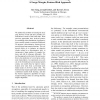Free Online Productivity Tools
i2Speak
i2Symbol
i2OCR
iTex2Img
iWeb2Print
iWeb2Shot
i2Type
iPdf2Split
iPdf2Merge
i2Bopomofo
i2Arabic
i2Style
i2Image
i2PDF
iLatex2Rtf
Sci2ools
123
click to vote
ACL
2012
2012
Discriminative Pronunciation Modeling: A Large-Margin, Feature-Rich Approach
We address the problem of learning the mapping between words and their possible pronunciations in terms of sub-word units. Most previous approaches have involved generative modeling of the distribution of pronunciations, usually trained to maximize likelihood. We propose a discriminative, feature-rich approach using large-margin learning. This approach allows us to optimize an objective closely related to a discriminative task, to incorporate a large number of complex features, and still do inference efficiently. We test the approach on the task of lexical access; that is, the prediction of a word given a phonetic transcription. In experiments on a subset of the Switchboard conversational speech corpus, our models thus far improve classification error rates from a previously published result of 29.1% to about 15%. We find that large-margin approaches outperform conditional random field learning, and that the Passive-Aggressive algorithm for largemargin learning is faster to conver...
Related Content
| Added | 29 Sep 2012 |
| Updated | 29 Sep 2012 |
| Type | Journal |
| Year | 2012 |
| Where | ACL |
| Authors | Hao Tang, Joseph Keshet, Karen Livescu |
Comments (0)

